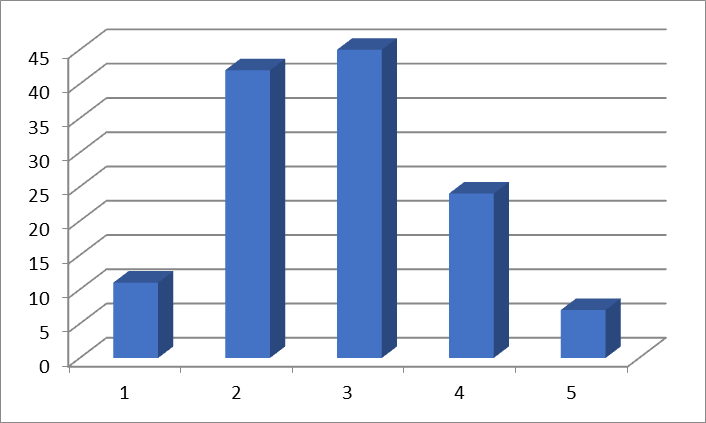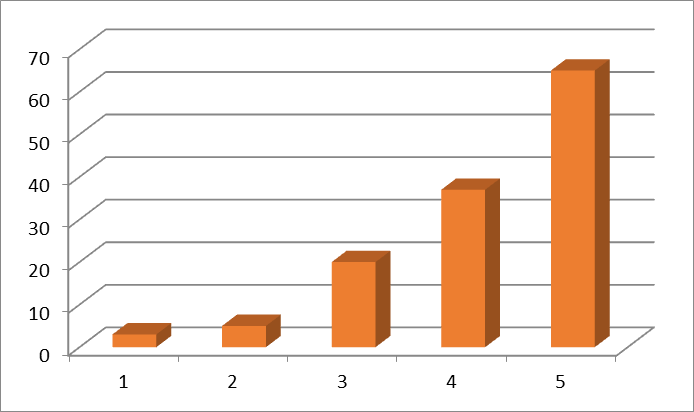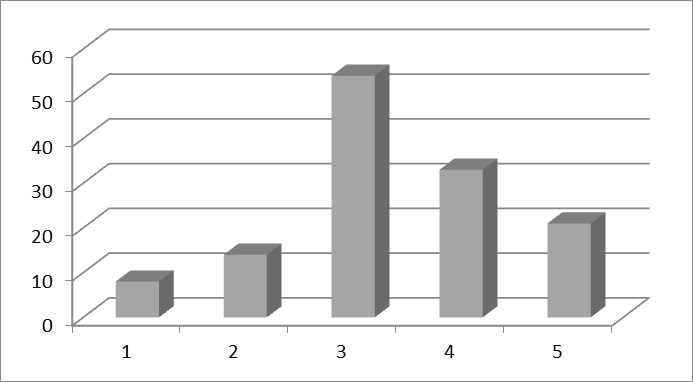Abstract
This article aims to identify and analyse the students' perception regarding the quality of services within technical tertiary education environment. This study is a conclusive research, the collected data being the subject of a quantitative analysis. Their purpose is to test hypotheses and to analyse the relationships between variables. Considering that students are the first beneficiaries of university education services, their perception is very important for improving the quality of higher education services. The three dimensions analysed are the learning environment, the teaching activity and the activities of the secretarial staff. The sample was made up of students from University POLITEHNICA of Bucharest. Only the students of the 2nd to 4th year have been considered eligible to take part in the survey as it is almost impossible to have a perception without having previous experience. The tool used within the research was the questionnaire (closed, open, dichotomous and trihotomic questions that covered all existing possibilities). Using the descriptive research carried out in this article, one can emphasize the following main findings: students appreciated as important in the educational process on one hand the equipment/assets of seminars, laboratories and libraries, and on the other hand the aspects related to didactic activity and the relations with teachers and secretaries. The most favourable perception is regarding the teachers and the least favourable perception is on the conditions in the students’ dormitories and secretariat. This research can be extended to all the factors involved in the educational process.
Keywords: Perceptionstudentsquality of servicestechnical tertiary education
Introduction
During the past years, specialists were seriously preoccupied towards researching students’ perception. In the literature, perception, as a specific variable of consumer behaviour, is the process by which the consumer "receives, selects, organizes and interprets environmental stimuli, giving them a certain meaning" (Cătoiu, Teodorescu, 2004). According to the Explanatory Dictionary of the Romanian Language, perception is a psychical process through which the objects and phenomena of the objective world that act directly upon the sense organs are reflected in all their attributes as a unitary whole (DEX 2016). The psychology dictionary describes perception as a complex psychological conduct by which an individual arranges his sensations and acquires knowledge of the real environment (Sillamy, 2000). Perception depends not only on physical stimuli, but also on the connection between stimuli and the environment, as well as on the inner state of each individual. It differs greatly from individual to individual because each reacts differently to the present stimuli.
A quantitative marketing research is usually conducted after a qualitative research; the quantitative (statistical) results are obtained by using specific techniques, such as: questionnaires and surveys. Authors have defined quantitative research in various ways: explaining phenomena by collecting numerical data that are analysed using mathematical methods (in particular, statistical ones) (Aliaga, Gunderson, 2000). Moreover, Gummesson stated that the quantitative research is considered to be more scientifically and therefore superior, despite its inability to treat the complexity of phenomena (Gummesson, 2006, p. 171).
Problem Statement
In the present paper the authors dealt with the perception in terms of consumer behaviour and carried out a three-dimensional analysis related to the students' perception regarding the quality of the technical university educational services. The three dimensions analysed are: the learning environment, the didactic activity and the work of the secretariat staff. The research is a quantitative one.
Research Questions
Purpose of the Study
The paper aims to empirically identify University POLITEHNICA of Bucharest students' perceptions regarding the quality of higher education services by testing hypotheses and analysing the relationships between marketing variables. The research was conducted online and the instrumentation used was the questionnaire administered to 130 students attending bachelor studies in the 2nd, 3rd and 4th years
Research Methods
Research objectives
Research hypothesis
Findings
After analysing the data, the authors found that the proportion of respondents was 41 male and 89 female. Of these, 62.3% come from urban areas, the rest of 37.7% come from rural areas. These percentages show that the urban population is more interested in the future of the children thus they send them to study.
Regarding the learning environment, the following aspects were taken into consideration: the classrooms, laboratories’ and seminaries’ endowment, library, cafeteria, accommodation and living conditions. Respondents had a scale of 1 to 5, where 1 is a very unfavourable perception and 5 a very favourable one. It can be noticed that 34, 6% (45 respondents) awarded the note 3 regarding this aspect and 32.2% (42 respondents) awarded 4 (Figure

Students' perceptions regarding the didactic activity can be seen in Figure

Figure

Conclusion
The following conclusions are drawn from the research: students from the undergraduate cycle of University POLITEHNICA of Bucharest appreciate the importance for the educational process of both the endowment of classrooms, seminars, laboratories and libraries and the aspects related to didactic and the secretarial staff activity.
The most favourable perception, however, relates to the teachers they consider very well prepared. This highlights the fact that staff, the most important resource in higher education, has a high level of expertise which leads to highly trained students able to meet the demands of the labour market.
The least favourable perception is in terms of the learning environment, namely the accommodation conditions. Moreover, the perception regarding the secretarial staff activity has improved considerably compared to a previous research (Manea, 2015). However, the respondents' perception remains at level 3.
The limits of the research consist in the lack of representativeness of the sample due to the fact that there were faculties whose students did not participate in this survey.
This research can be extended to another direction, namely to one that addresses to all the actors involved in the educational process: teachers, administrative staff and secretarial staff.
Acknowledgments
This work has been funded by University POLITEHNICA of Bucharest, through the “Excellence Research Grants” Program, UPB-GEX. Identifier: UPB-EXCELENȚĂ-2016 Research project title: Ways of enhancing the quality of higher education services through perception researching of factors involved in the educational process, Contract number 56/26.09.2016, (ID Project 389).
References
- Aliaga, M., Gunderson, B., (2000), Interactive Statistics, Prentice Hall, SUA.
- Cătoiu I, Teodorescu N., (2004), Comportamentul consumatorului, [Consumer’s behavior], 2nd Edition, Uranus Publishing House, Bucharest.
- Dicționarul Explicativ al Limbii Romane [Explanatory Dictionary of the Romanian Language], (2016), Univers Enciclopedic Gold Publishing House, Bucharest.
- Gummesson, E., 2006, Qualitative Research in Management - Addressing Complexity, Context and Personal, Management Decision, vol. 44 (2), pp. 167-179.
- Manea, N., 2015 – Marketingul serviciilor educaționale – abordare din perspectivă universitară [Educational services marketing – universitary perspective approach], Printech Publishing House, Bucharest.
- Sillamy, N., 2000 - Dictionar de psihologie Larousse [Psycology Dictionary Larousse], Univers Enciclopedic, Publishing House, Bucharest.
Copyright information

This work is licensed under a Creative Commons Attribution-NonCommercial-NoDerivatives 4.0 International License.
About this article
Publication Date
28 June 2018
Article Doi
eBook ISBN
978-1-80296-040-2
Publisher
Future Academy
Volume
41
Print ISBN (optional)
-
Edition Number
1st Edition
Pages
1-889
Subjects
Teacher, teacher training, teaching skills, teaching techniques, special education, children with special needs
Cite this article as:
Manea, N., & Bucovetchi, O. B. (2018). Students Perception Towards The Quality Of Education Services Within Technical Universities. In V. Chis, & I. Albulescu (Eds.), Education, Reflection, Development – ERD 2017, vol 41. European Proceedings of Social and Behavioural Sciences (pp. 265-270). Future Academy. https://doi.org/10.15405/epsbs.2018.06.32

